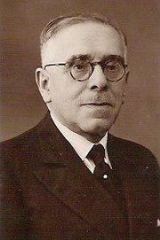
Óscar Moreno
Encyclopedia
Óscar Moreno was a Portuguese
urologist, doctor
, scientist
and chemist
.
. There he specialized in urology, completing his doctorate in medicine in the year of 1911. His thesis "About Kidney Functions" received the best classification.
Moreno devoted his work in particular to the exploitation of functional kidneys, and contributed to the discovery of "Ambard constant," also called the "Ambard-Moreno constant," which is used to assess the state of operation of the kidney.
He died in Porto, in the parish of Victoria.
"Volume et des urines maximum concentration. Signification diagnosed de la pyurie", in collaboration with Heitz Boyer, Médicale Presse, March 29, 1911;
"Des injections de pâte bismuthée en chirurgie urinaire", in collaboration with Heitz Boyer, Anal. des evil. des voies urinaires, 11, 1910;
"Comparaison du fonctionnement rénal avant et après la néphrectomie", in collaboration with Chevassu, Revue de Gynécologie, 1911.
Portuguese people
The Portuguese are a nation and ethnic group native to the country of Portugal, in the west of the Iberian peninsula of south-west Europe. Their language is Portuguese, and Roman Catholicism is the predominant religion....
urologist, doctor
Physician
A physician is a health care provider who practices the profession of medicine, which is concerned with promoting, maintaining or restoring human health through the study, diagnosis, and treatment of disease, injury and other physical and mental impairments...
, scientist
Scientist
A scientist in a broad sense is one engaging in a systematic activity to acquire knowledge. In a more restricted sense, a scientist is an individual who uses the scientific method. The person may be an expert in one or more areas of science. This article focuses on the more restricted use of the word...
and chemist
Chemist
A chemist is a scientist trained in the study of chemistry. Chemists study the composition of matter and its properties such as density and acidity. Chemists carefully describe the properties they study in terms of quantities, with detail on the level of molecules and their component atoms...
.
Early life
Moreno was born in Porto, in the parish of Victoria, the son of Joseph Lawrence Russo, and Lucinda de Sousa Martins Ribeiro. His uncle (on his mother's side) was Dr. Rodrigo de Sousa Moreno, doctor of the medical school of Porto and administrator of the county of Gondomar.Studies
Influenced by his uncle, he started his medical studies in the School of Medicine and Surgery of Porto. On completing the course of medicine in 1908 as a student of Roberto Frias, he attended the Medical School of Paris (Necker Hospital) as a student of Marie CurieMarie Curie
Marie Skłodowska-Curie was a physicist and chemist famous for her pioneering research on radioactivity. She was the first person honored with two Nobel Prizes—in physics and chemistry...
. There he specialized in urology, completing his doctorate in medicine in the year of 1911. His thesis "About Kidney Functions" received the best classification.
Career
Moreno was monitor of the Urinary service in the Medical School of Paris (Necker Hospital) from 1908 to 1911. He was also hired to be Professor of Urology at the School of Medicine of Porto, from 1917 to 1948, the first professor to occupy that position in the School of Medicine of Porto. He founded and directed the Department of Urology in the General Hospital of Santo António (1924), originally called the Department of Urology and Venerology.Moreno devoted his work in particular to the exploitation of functional kidneys, and contributed to the discovery of "Ambard constant," also called the "Ambard-Moreno constant," which is used to assess the state of operation of the kidney.
He died in Porto, in the parish of Victoria.
Scientific Papers
Moreno published numerous scientific papers, published in Portugal and abroad:"Volume et des urines maximum concentration. Signification diagnosed de la pyurie", in collaboration with Heitz Boyer, Médicale Presse, March 29, 1911;
"Des injections de pâte bismuthée en chirurgie urinaire", in collaboration with Heitz Boyer, Anal. des evil. des voies urinaires, 11, 1910;
"Comparaison du fonctionnement rénal avant et après la néphrectomie", in collaboration with Chevassu, Revue de Gynécologie, 1911.
External links
- http://www.hgsa.pt/servicos.php?id=14
- http://www.apurologia.pt/urologiaemport1.htm
- http://www.apurologia.pt/urologiaemport3.htm
- http://www.geneall.net/P/per_page.php?id=1046611

